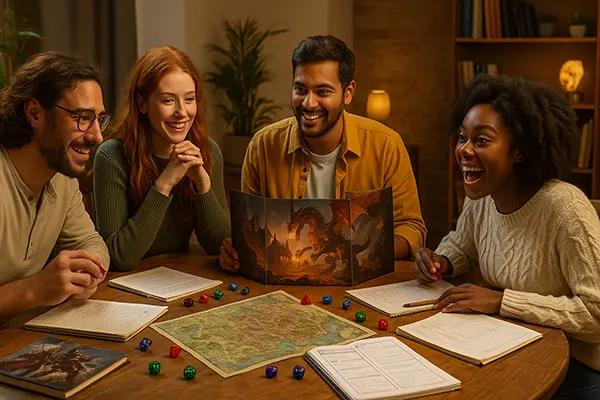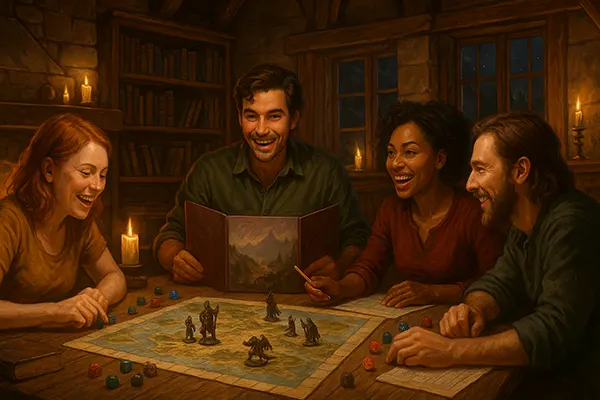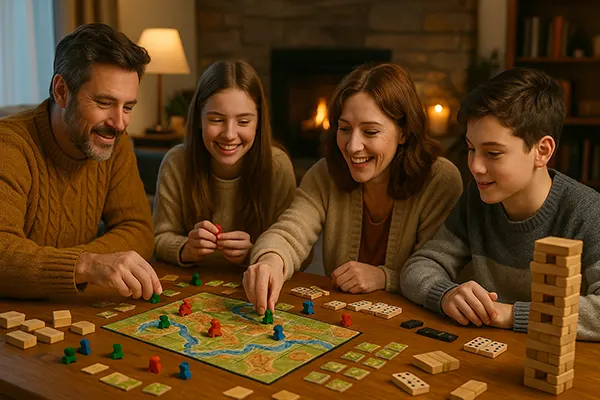
Game Night Adventures: The Magic of Tabletop Role-Playing Games with Friends
Tabletop role-playing games, such as Dungeons & Dragons, Pathfinder, and Call of Cthulhu, have become a beloved way for friends to spend an evening together. In 2025, these games remain a powerful mix of creativity, imagination, and teamwork, offering something digital entertainment often lacks — genuine human connection and storytelling.
What Makes Tabletop Role-Playing Games Special
Unlike typical board games, tabletop role-playing games (TTRPGs) let participants build entire worlds through conversation and imagination. One player takes on the role of Game Master (GM), who guides the story, controls the world’s challenges, and narrates events. The others become heroes or adventurers whose choices shape every outcome.
The appeal of TTRPGs lies in their flexibility. Every session is unique, shaped by the players’ creativity rather than rigid rules or computer code. Whether your group prefers epic fantasy quests or noir detective stories, the system adapts easily to your style and imagination.
Moreover, these games encourage collaboration and problem-solving. A night spent exploring a dungeon or negotiating with a dragon often becomes a memorable social event, strengthening friendships through shared experiences, laughter, and clever solutions.
Popular Role-Playing Systems for 2025
Dungeons & Dragons remains the leading choice, especially with the success of the 5th Edition and the growing popularity of digital tools that simplify gameplay. However, in 2025, independent systems like Blades in the Dark and Monster of the Week have gained traction for their cinematic approach and faster setup time.
Pathfinder 2e continues to attract strategy enthusiasts who enjoy tactical depth, while narrative-driven systems such as Fate Core appeal to those who prefer storytelling over dice mechanics. The diversity of systems available today means every group can find something that fits their preferences perfectly.
For those looking to explore horror, Call of Cthulhu remains unmatched. Its investigative nature, focus on psychological tension, and Lovecraftian atmosphere create a thrilling contrast to high-fantasy adventures.
How to Organise a Perfect Game Night
Hosting a tabletop role-playing game night starts with preparation. Decide on the game, storyline, and tone early. If your group is new, a short, self-contained adventure is ideal. The Game Master should familiarise themselves with the rules and prepare character sheets, maps, and any visual aids.
Snacks, drinks, and a comfortable playing space matter more than you might think. The key is to make everyone feel relaxed and ready to participate. Setting a clear time frame also helps — most sessions last around three to four hours, depending on the story’s pace.
Finally, ensure communication between players remains respectful and inclusive. Every participant should have the opportunity to contribute, whether through dialogue, decision-making, or role-playing. This balance turns a casual night into a memorable experience that keeps everyone coming back.
Tips for a Smooth and Enjoyable Session
Begin the evening with a recap of the previous game or an introduction if it’s a new campaign. Encourage creative solutions and reward collaboration. Remember that the goal is enjoyment, not perfection, so keep rules flexible when it benefits storytelling.
Use background music to set the atmosphere — fantasy soundtracks, ambient tavern sounds, or even simple nature loops work wonders. Some players also use virtual dice rollers and apps to streamline gameplay, especially when playing remotely.
Don’t forget to celebrate small moments: a clever idea, an unexpected twist, or a heroic sacrifice. These moments make the story personal and memorable, reinforcing why tabletop gaming continues to thrive in 2025.

The Social and Psychological Benefits of Role-Playing Games
Beyond entertainment, tabletop role-playing games contribute significantly to emotional well-being. They enhance empathy, creativity, and communication skills. When players step into different characters’ shoes, they practise understanding diverse perspectives and emotional situations.
Studies conducted between 2023 and 2025 have shown that regular participation in TTRPGs improves problem-solving abilities and reduces social anxiety. The cooperative nature of these games provides a safe space to express oneself without judgment, which is particularly valuable in today’s digital era.
Additionally, TTRPGs foster resilience and critical thinking. Players learn to adapt to unexpected events, assess risks, and make decisions collectively — skills that translate into everyday life and teamwork scenarios.
Why Game Nights Are Here to Stay
Despite technological advances in virtual reality and video gaming, tabletop role-playing continues to grow in popularity. It offers a slower, more personal form of interaction that no screen can replicate. The act of storytelling, rolling dice, and laughing together creates genuine memories that endure far beyond the game itself.
Communities around the world now host “RPG Nights” in cafés, libraries, and local clubs. These gatherings bring together people of all ages who share a love for creativity and adventure. In 2025, this tradition remains one of the most authentic ways to connect with others face-to-face.
So, the next time you’re looking for a new way to spend an evening with friends, consider gathering your party and embarking on a tabletop quest. Whether it’s battling dragons, solving mysteries, or just sharing a story, every session becomes an unforgettable adventure.



